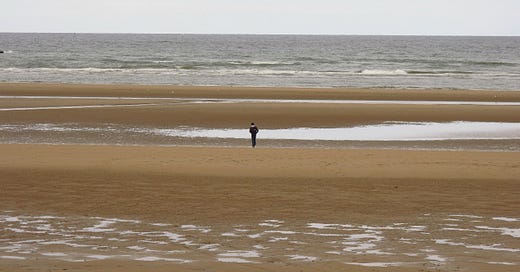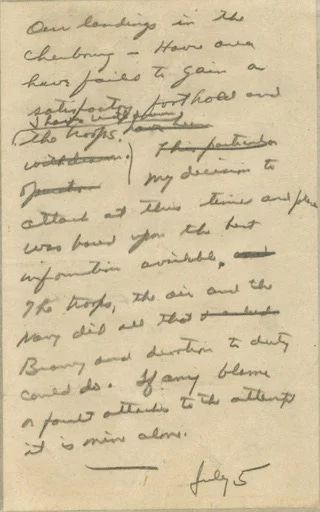Author’s Update: I originally posted this a year ago when the world was in a different place and it looked as if the forces of good might prevail. They did not, and now we owe it to ourselves, those of the Greatest Generation, to look back, learn their lessons, absorb their wisdom, and plot our own path through the darkness. Reed (06/06/2025)
I went to Normandy in 2012 with my father and a group of families and veterans to attend the dedication of the Company Officers Memorial, based on Lt. Richard Winters, later of Band of Brothers fame. The mood was proud and solemn.
Normandy defies description short of seeing it with one’s own eyes. It’s not visual so much, as spiritual. The life force of the young men who died there imbues the cemetery, the bluffs, and the beaches with the winds of humanity and justice.
To see the distance from the waterline and low tide to the seawall on Omaha Beach left me shrunken. The open, empty space of the place forced me to look up to all those souls; the rifleman, the sailors, the pilots, who knew their jobs and did sacrificed for their friends, their families, their country, and millions of free men and women whom they would never see in a free world thousands of them would never have the chance to enjoy.
As we face a battle of our own time, we must remember we’re not being asked to step off a landing craft or jump from a rickety airplane into the unknown. Our tasks are safer to be sure, and even mundane, but important nonetheless. As the 80th anniversary of the D-Day landings wash over us, take hold of the spirit of those that came before us, that gave their last full measure of devotion, understood their tasks and faced their fears to do their duty.
We freedom-loving, democracy-defending Americans, we the lucky and the free, owe them nothing less.
“Okay, let’s go.”
With those few words, Supreme Allied Commander General Dwight D. Eisenhower set in motion the greatest invasion in human history. After nearly five years of war, the Allied armies of the United States, the UK, and Canada went ashore on the Cotentin Peninsula in the Normandy region of France. The event represented a pinnacle of military, economic, political, and social cohesion.
In those hours, Eisenhower, like the millions of men he commanded, demonstrated fortitude, leadership, and accountability.
As the armada crossed the English Channel, soldiers read the following message from Eisenhower:
SUPREME HEADQUARTERS
ALLIED EXPEDITIONARY FORCE
Soldiers, Sailors, and Airmen of the Allied Expeditionary Force!
You are about to embark upon the Great Crusade, toward which we have striven these many months. The eyes of the world are upon you. The hope and prayers of liberty-loving people everywhere march with you. In company with our brave Allies and brothers-in-arms on other Fronts, you will bring about the destruction of the German war machine, the elimination of Nazi tyranny over the oppressed peoples of Europe, and security for ourselves in a free world.
Your task will not be an easy one. Your enemy is well trained, well equipped and battle-hardened. He will fight savagely.
But this is the year 1944! Much has happened since the Nazi triumphs of 1940-41. The United Nations have inflicted upon the Germans great defeats, in open battle, man-to-man. Our air offensive has seriously reduced their strength in the air and their capacity to wage war on the ground. Our Home Fronts have given us an overwhelming superiority in weapons and munitions of war, and placed at our disposal great reserves of trained fighting men. The tide has turned! The free men of the world are marching together to Victory!
I have full confidence in your courage, devotion to duty and skill in battle. We will accept nothing less than full Victory!
Good luck! And let us beseech the blessing of Almighty God upon this great and noble undertaking.
Eisenhower, though, knows that despite the countless decisions, months of training, weeks of bombing, and endless planning sessions, that the invasion could still fail. He prepares for potential failure with the following handwritten note, found later by an aide.
“Our landings in the Cherbourg-Havre area have failed to gain a satisfactory foothold and I have withdrawn the troops," Eisenhower wrote. "My decision to attack at this time and place was based upon the best information available. The troops, the air and the Navy did all that bravery and devotion to duty could do. If any blame or fault attaches to the attempt it is mine alone."
Today, it is hard to imagine the crushing responsibility one person felt for the future of the free world. Eisenhower did not shy away from accountability, he understood the stakes, and stood ready to accept the consequences. As NPR’s Scott Simon wrote, “Ike didn't try to camouflage failure in phrases like, "Mistakes were made," "Our projections were not met" or "I will say nothing pending investigation." He wrote, "any blame or fault ... is mine alone.”
Watching Band of Brothers, The Longest Day, and Saving Private Ryan has become an annual ritual for me. Each of them are brilliant and astonishing in their own ways.
Please check out Garrett Graff’s new book, When the Sea Came Alive, an Oral History of D-Day. You can buy it here. Garrett is a fabulous storyteller.







Visited with David Eisenhower last year- you describe the spiritualness well. Sobering to visit the batteries of Pont du Hoc. Surviving that day must have been scaring- a miracle. Like you, i feel a deep connection to those that gave so much for succeeding generations to thrive. Even the German Chancellor is grateful for throwing off the yoke of Nazi dictatorship. May MAGA take note.
Reed…Beautiful written and something to read over and over. The character of our leaders in the past, like Eisenhower , at that moment in history was stellar…and it saddens me to see our country being run today by the dregs of society…with no allegiance to our country and it’s citizens but only to themselves and what power and financial gain they can get out of it. How very sad for all Americans that we have lost our way…